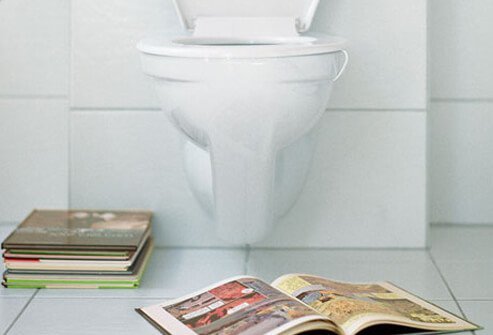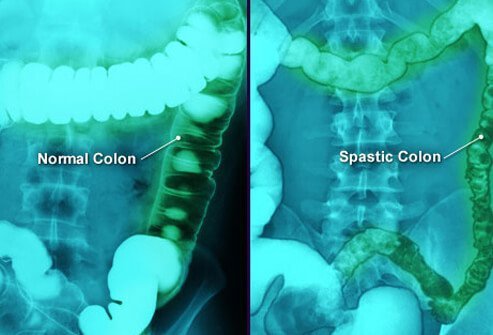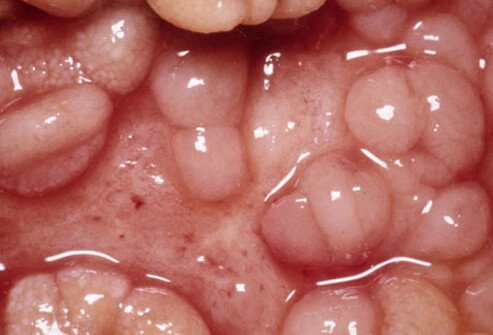IBS vs. IBD: Differences and Similarities
IBS vs. IBD: Are they the same bowel disease?

- IBS (irritable bowel syndrome) and IBD (inflammatory bowel disease) are not the same problems with the digestive tract.
- IBS usually causes no ulcers or lesions in the bowel, and it involves only the colon.
- IBD is a term used for a group of bowel diseases that cause inflammation in the digestive tract. The most common forms of IBD are ulcerative colitis (UC) and Crohn's disease.
- IBD causes ulcers in the tissue of the digestive tract that may occur almost anywhere from the mouth to the anus. (Crohn's disease can affect any portion of the GI tract, while ulcerative colitis only affects the large and small intestine, rectum, and anus).
- Researchers don not know the exact cause of IBS or IBD, however, they suspect multiple factors may cause IBS, and an immune system problem may cause IBD.
- These diseases are often confused because they have some similar symptoms (for example, persistent diarrhea, abdominal pain, and nausea and/or vomiting), they sound similar, and have almost identical abbreviations.
- There is no cure for IBS or IBD, (Crohn's disease and UC), but IBD has more serious symptoms than IBS. For example; ulcers in the bowel, rectum, or anus; rectal bleeding, and anemia. Treatment requires medication, and some patients need surgery.
- IBS is treated and managed with medications and lifestyle changes like diet and stress reduction.
What is IBS (irritable bowel syndrome)?

IBS (irritable bowel syndrome) is a common disorder of the large intestine (colon) that causes symptoms of cramping, abdominal pain, bloating, gas, diarrhea, and/or constipation. Researchers and doctors do not know the exact cause of IBS, but they suspect that multiple factors, for example, foods, stress, hormones, or other illnesses combined with gut bacteria trigger abnormal bowel muscle contractions in the gastrointestinal (GI) nervous system.
What is IBD (inflammatory bowel disease)?

Inflammatory bowel disease (IBD) is a term used to describe a group of inflammatory conditions mainly in the large and small bowels. The two most common types of IBD that occur are Crohn’s disease and ulcerative colitis, or UC. Other types of IBD include ulcerative proctitis, proctosigmoiditis, left-sided colitis, pancolitis, and acute severe ulcerative colitis.
Where does the pain occur in IBS vs. IBD?
Abdominal pain in IBS may be spread over a wide area of the abdomen, but it can localize in the lower left area of it. The pain may intensify while eating meals, when gas is present in the GI tract, and from abdominal bloating. A bowel movement may reduce the pain.
Abdominal pain in IBD may occur anywhere in the abdomen, and its location may suggest the type of IBD that you may have (for example, left-sided abdominal pain is a classic symptom of ulcerative colitis).
What are the similarities in signs and symptoms of IBS and IBD?
Initially, it is difficult for doctors to diagnose IBS and IBD because sometimes some of the symptoms are similar, for example:
- Abdominal pain
- Diarrhea
- Abdominal cramping
- Nausea, and/or vomiting
- An urgent need for a bowel movement
What are the differences between the signs and symptoms of IBS vs. IBD?
- Changes in bowel movement
- Changes in how the stools look
- Abdominal bloating
- Whitish mucus in the stool
- A feeling of not having finished a bowel movement.
- Sexual dysfunction
- Fibromyalgia
- Urinary frequency and urgency
Some people with IBS have IBS-D in which diarrhea is one of the primary symptoms, or IBS-C in which constipation is one of the primary symptoms.
Symptoms unique to IBD (Crohn's disease and ulcerative colitis) are more serious, and include:
- Anemia
- Eye redness or pain
- Feeling tired
- Fever
- Joint pain or soreness
- Skin changes
- Unintended weight loss
- Loss of appetite
- Rectal bleeding
What causes IBS vs. IBD?
Although some patients may show microscopic areas of inflammation in IBS, the causes are speculative and may include hyperreactivity to bacterial gut infections, accelerated or delayed transit of contents through the GI tract (diarrhea or constipation), and abnormal bowel contractions caused by triggers such as foods or stress.
The exact cause of IBD is not known. Researchers suggest the IBD types are caused by an immune system malfunction in the bowel tissue, with a genetic predisposition to develop IBD, and the individual’s response to gut microorganisms.
Does stress affect IBS or IBD?
What are the treatments of IBS vs. IBD?
Treatment for IBD includes anti-inflammatory drugs like aminosalicylates and corticosteroids, immune system suppressors (many types like azathioprine, cyclosporine, and methotrexate), and antibiotics (metronidazole or ciprofloxacin). Some patients may require surgery (removal of the entire colon and rectum or in others, removal of damaged segments of small bowel).
Treatment for IBS is mainly diet, however, several drugs, for example, alosetron (Lotronex), rifaximin (Xifaxan), lubiprostone (Amitiza) are approved to treat IBS.
Other medications may be used to reduce symptoms of either condition, for example, Tylenol, antiemetics, laxatives, and antidepressants.
How does diet effect IBS diet vs. IBD?
An IBD diet is designed to reduce any bowel problems aggravated by food. Recommendations include:
- Limit dairy products.
- Eat low-fat foods.
- High-fiber foods may aggravate IBD.
- Avoid spicy foods, alcohol, and caffeine.
- Eat small meals.
- Drink plenty of water.
- Consider taking a multivitamin.
- The diet for IBS is far simpler.
- Drink plenty of water.
- Avoid any foods that make you bloated or “gassy.”
- Do not over-eat fiber as this may cause gas and bloating. Probiotics may help reduce symptoms.
If you have irritable bowel syndrome or inflammatory bowel disease diet changes may be useful for patients with IBS, and especially IBD, to seek advice from a dietician.
Is there a cure for IBS or IBD?
There is no cure for IBD, but treatments can reduce symptoms. There are claims that IBS can be cured with treatments. Discuss treatments with your primary care doctor and your gastroenterologist.
